26.09.2024
Partnering with a future-focused bank
Launched in January 2016, imagin has already reached more than a million customers. They are Spain’s …
)
region are restoring landscapes through tree planting, agroforestry, and sustainable land management. Together, they have planted millions of trees, stabilised the mountain’s fragile slopes, and built a thriving network of SACCOs that distribute carbon credit income and support community projects.
But behind these impressive numbers are thousands of individual stories of transformation. Each one shows how restoring nature also restores livelihoods.
"I never imagined trees could pay for my children’s education."
Teddy Kulaba
Ruwenzori landscapes farmer and SACCO member
The Rwenzori project connects local restoration with global climate action through
Farmers join the initiative through their SACCO and receive tree seedlings to plant on their farms.
As these trees grow, they provide multiple benefits: shade, firewood, fruit, soil protection, and more stable water systems. Their growth is monitored, and the carbon they store is verified and sold on international carbon markets through the Trees for Global Benefits (TGB) program, run by ECOTRUST.
Farmers earn annual payments for every verified tree they protect over a 10-year period. These payments are distributed through SACCOs, which also help farmers save, borrow, and reinvest collectively.
Carbon payments are making a difference, farmer by farmer:
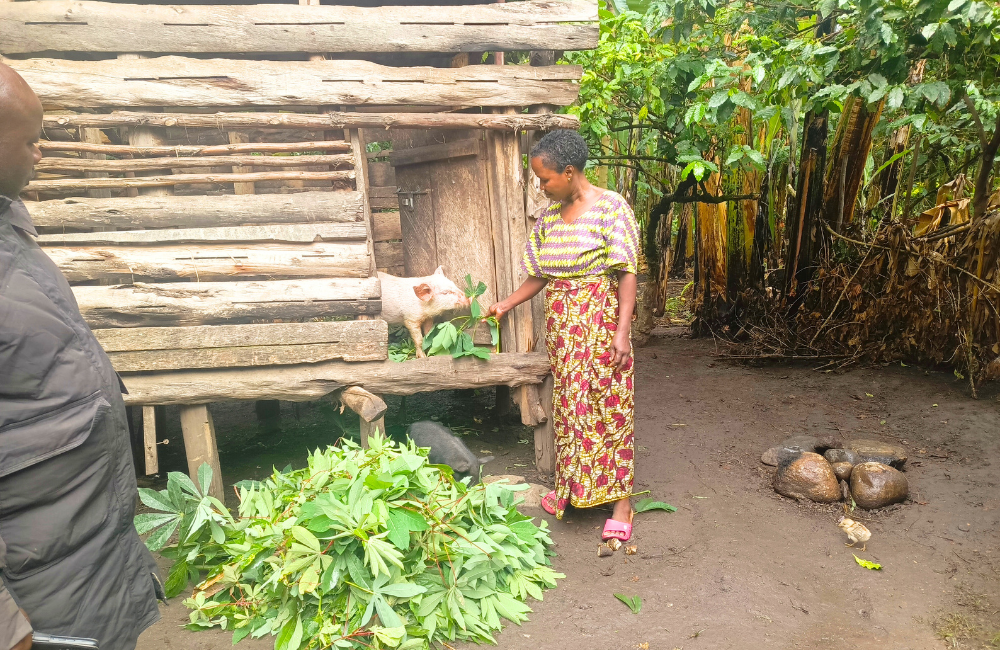
Teddy Kulaba, a widow from Kasithu village, joined the project in 2022. She received tree seedlings, Albizia coriaria and Cordia Africana species, to plant alongside her coffee crops. These trees help enrich the soil and improve yields, creating an agroforestry system that protects her land and strengthens her coffee production.
Teddy earns annual carbon credit payments, which reward her for every tree she plants and protects. This extra income has been transformative, allowing her to pay her children’s school fees and provide them with opportunities she never had.
In addition to tree planting, Teddy benefited from the revolving livestock scheme, where she received a piglet to rear. When it reproduced, one piglet was passed on to another farmer. Teddy then sold one of her other pigs and used the money to start a small business trading beans and cassava flour.
As part of her journey, Teddy also joined the local coffee group and SACCO. Here, farmers sell their coffee collectively at market price to the SACCO and receive annual bonuses from the profits at the end of the season. This system boosts their earnings while building collective financial strength for the community.
Beyond income, the project has also improved Teddy’s access to healthcare. Through its clinic, she now only pays 50% of treatment costs, while the SACCO covers the rest. This has eased the burden of medical expenses, allowing her to seek care for herself and her children whenever they need it.
When asked what had surprised her most about the project, Teddy smiled and said, “The trees are mine, and I still get money from them.”
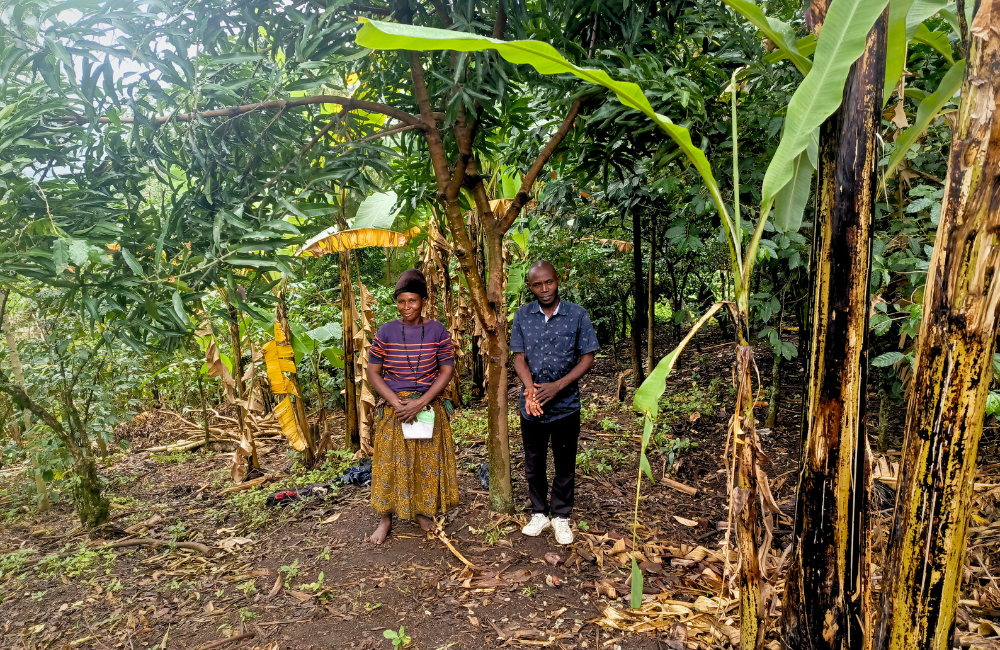
Nguru Danis and his wife joined the project in 2022, determined to improve their land. Before joining, strong winds would regularly damage their home, leaving them vulnerable. With seedlings provided by the project, they began planting trees around their land. These trees now serve as natural windbreakers, shielding their home and crops from damage.
Through these same trees, Danis earns annual carbon credit payments. This income has allowed him to pay for his children’s school fees and, most importantly, build a permanent house, something he had dreamed of for many years but never thought possible.
In addition to income, the project has given Danis access to affordable healthcare. This support has made it possible for him and his family to seek care without the fear of overwhelming expenses.
Danis has also taken part in training on regenerative agriculture, which has been especially valuable because his farm sits on a slope. These practices help him maintain healthy, fertile soil and prevent erosion. In addition, he has attended social well-being trainings that focus on family unity and peace, skills he says have strengthened relationships in his household.
Beyond his own farm, Danis is part of a small savings group made up of 13 project members. Each month, every member contributes 30,000 Ugandan shillings, and the pooled funds are given to one person on a rotating basis. This system provides each member with a lump sum they can use for farming, school fees, or emergencies.
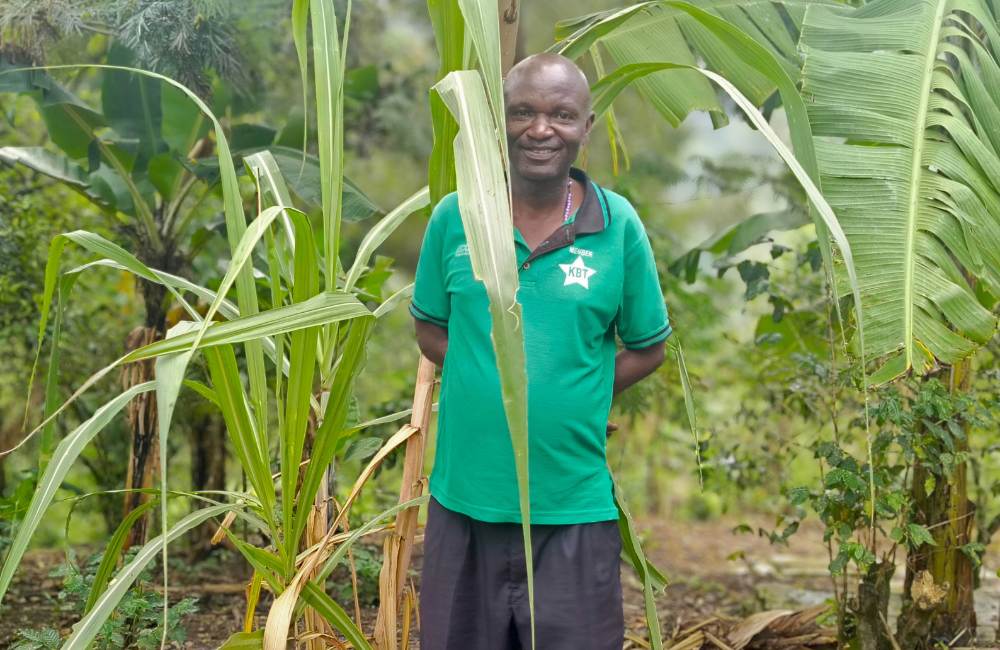
When Mbasa Julius, a farmer from Kaghorwe village, joined the project, he gained access to tree seedlings to plant on his land and began receiving annual carbon credit payments.
With these payments, he has been able to pay his children’s school fees. The income also helped him start a diversified farm, where he now raises pigs and goats and has even added a beehive. This mix of livestock and beekeeping provides his family with food and a more reliable source of income.
Julius is also part of a revolving savings group, where members contribute to a shared fund that is given to one person at a time on a rotating basis. This system has been a lifeline, allowing him to invest in his farm and handle emergencies without falling into debt.
He has learned the value of saving and planning through financial management training initiatives by the project. In the past, he often spent whatever he earned immediately, but now he sets aside part of his carbon credit income, giving his family greater stability and security for the future.
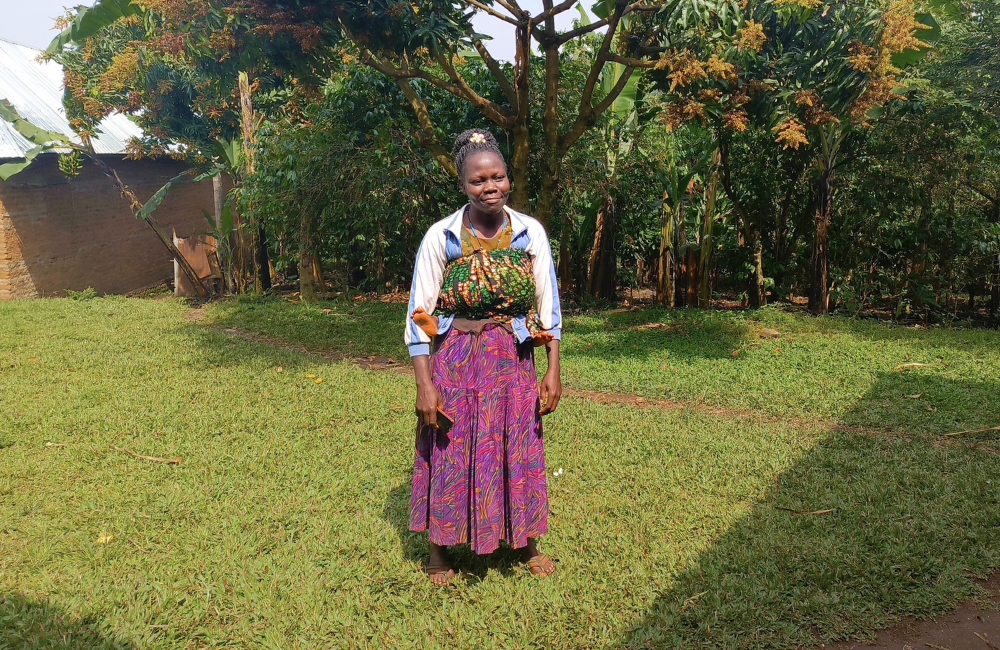
Mbambu Felezia joined the project in 2023, eager to improve her family’s livelihood and restore her land. With her first carbon credit payments, she was able to purchase pigs and expand her small business, boosting her family’s stability and food security.
Felezia is also part of a revolving savings group made up of 20 members. Each month, every member contributes 20,000 Ugandan shillings, and the total amount is given to one person on a rotating basis. This system has provided her with the funds to invest in her farm and cover essential household needs.
She attends regular training sessions that teach leadership and financial management skills, which have helped her plan for the future and manage her growing business more effectively.
For Felezia, the financial support from carbon credits has been invaluable, but what she cherishes most are the friendships she’s built along the way. She says connecting with other farmers has given her a sense of belonging and a network of people who share her hopes for restoration and growth.
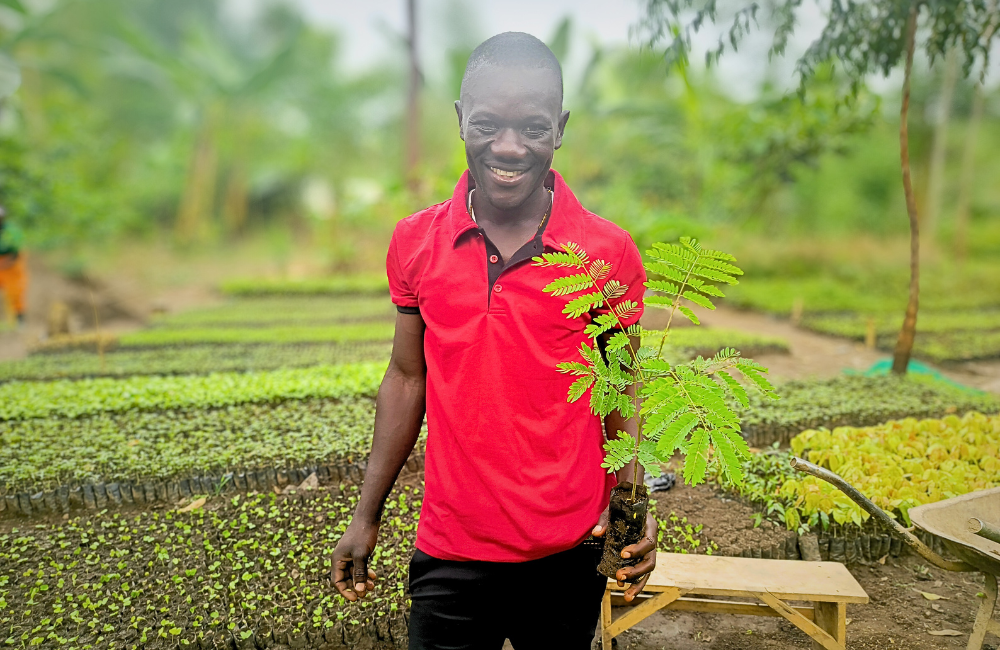
He began his journey with the project in 2015 as a farmer, planting 200 trees on his land. Over the years, those trees brought him annual carbon credit payments, helping to stabilise his income and improve his family’s life.
In 2023, using some of his carbon credit earnings, Joseph took a bold step and started a small-scale tree nursery to supply seedlings to other farmers. What began modestly has now grown to an impressive 200,000 seedlings ready for planting.
This nursery has been transformative for the whole community. Before Joseph started it, farmers often had to wait a long time to access seedlings, which delayed their planting seasons. Now, he provides a reliable and timely supply, easing farmers’ workload and helping them plant on schedule. Many farmers have expressed their appreciation for how Joseph has made their restoration work easier and more efficient, a feeling that fills him with pride and purpose.
The nursery also creates employment opportunities. He has employed six year-round workers and may employ up to 20 workers during busy periods. This flexible workforce provides income for local families while supporting the region’s reforestation efforts.
Through his nursery business and carbon credit income, Joseph has achieved:
Education:
He upgraded his own studies, moving from Senior 4 to a diploma level, investing in his skills and leadership.
Family well-being:
Joseph has seven children, six of whom are in school thanks to the funds from his nursery and carbon credits. His family now lives comfortably with access to stable housing, nutritious food, and reliable healthcare.
Permanent home:
He built a permanent house, providing his family with long-term stability and security.
Transportation:
Joseph purchased a motorcycle, allowing him to travel daily to the field and deliver seedlings to farmers quickly and efficiently.

Byaruhaga Grammar joined the project in 2019, and over the years, his farm has become a shining example of what nature-based solutions can achieve.
Unlike other farmers in the region, he has established a woodlot in addition to his agroforestry crops, a remarkable achievement because his land sits on a steep slope, where soil erosion and degradation are serious challenges. His woodlot protects the fragile soil and provides sustainable resources for his household.
Alongside this, he has integrated regenerative agriculture and agroforestry practices across his farm, making it a model of sustainable land management. Because of his success, other farmers often visit his land to learn about these methods firsthand. His farm has become a learning site, showing how tree planting, soil health practices, and careful land management can restore degraded slopes while improving yields.
Through his annual carbon credit income, Byaruhaga has been able to:
Purchase piglets and goats, expanding his farm’s diversity and income streams.
Complete the construction of a permanent home, providing his family with stability and security.
Pay school fees for his children and grandchildren, ensuring access to education for two generations.
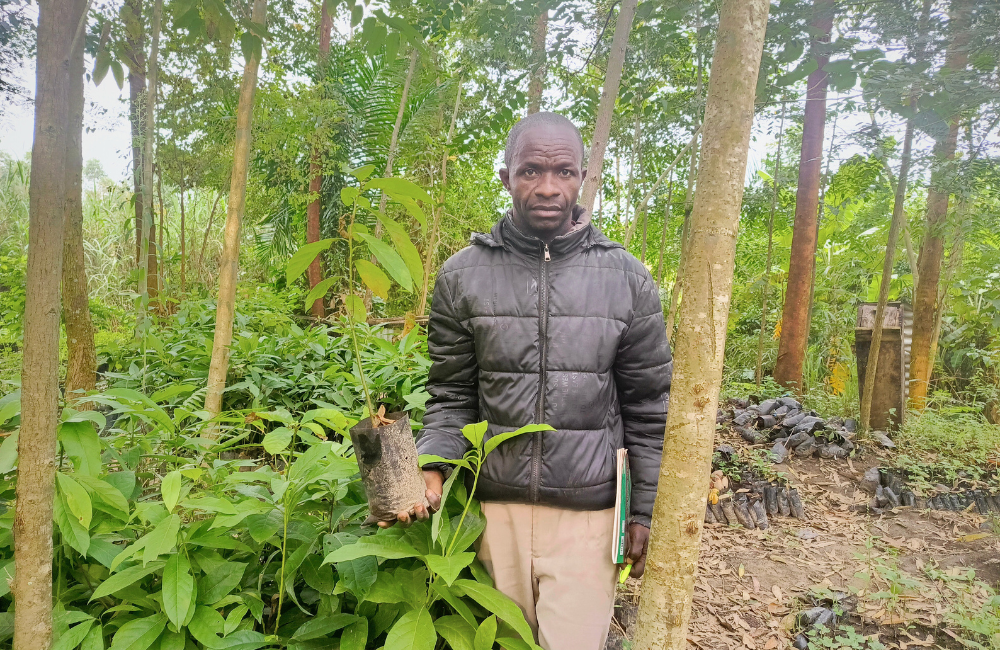
Peter Kule runs a successful tree nursery that supplies seedlings to farmers across the Rwenzori region. His nursery provides a reliable source of income for his family while supporting local restoration efforts.
With his earnings, Peter has been able to pay school fees for his children, buy land, and start a small business trading beans and cassava flour. Through the project’s SACCO, he regularly saves and reinvests, building long-term financial stability.
Peter also rears goats and pigs, adding another source of food and income. His entire family is actively involved in managing the nursery and farm, turning it into a true family enterprise.
Beyond supporting his household, Peter employs four permanent workers year-round and up to 18 seasonal workers during peak planting periods. This provides vital jobs for local families while ensuring farmers have access to seedlings when they need them most.
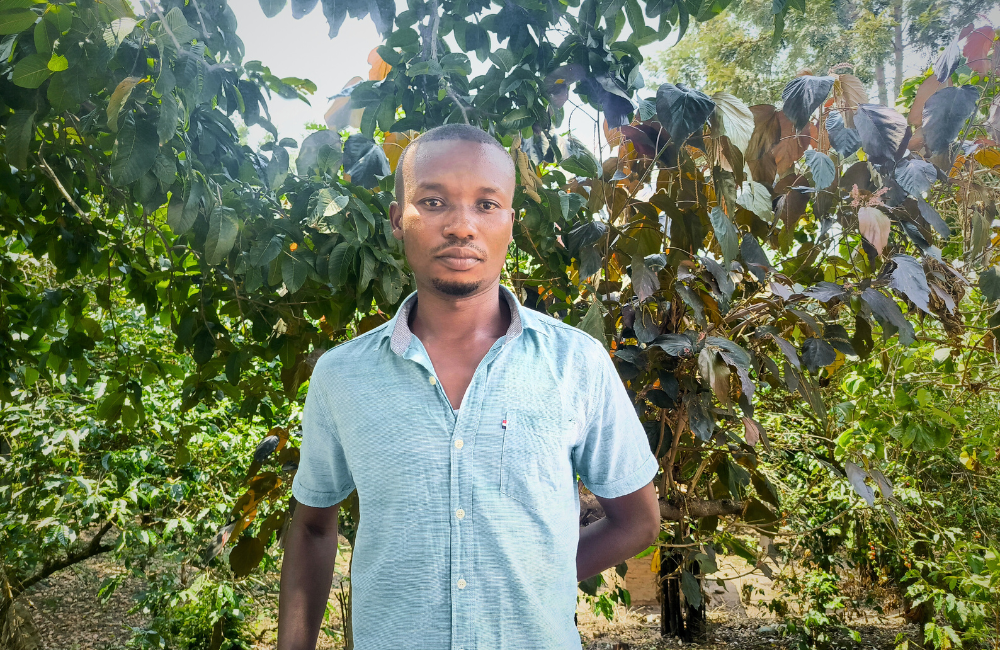
Growing up, Alfred’s single mother used her annual carbon credit income to pay for his university studies. His family had been facing major financial strains, and without this support, Alfred’s dream of completing university would not have been possible.
After graduating, he returned home with a deep sense of gratitude and purpose. Today, he works as a field officer with the Trees for Global Benefits (TGB) project, the very initiative that once supported his family.
In his role, Alfred trains farmers on sustainable practices such as tree planting, regenerative agriculture, and sustainable land management. He spends his days walking alongside farmers, helping them understand how to restore their land while improving their livelihoods.
For Alfred, this work is personal. He sees it as a way to give back the knowledge and opportunities that the project gave him and his family. Through his training sessions, he is impacting entire communities, passing on skills and hope just as others once invested in him.
These stories highlight just a few of the thousands of lives being transformed through restoration across the Ruwenzori landscapes. In total, over 11,000 farmers are working together to plant millions of trees, protect biodiversity, and strengthen their communities through nature-based solutions.
The impact reaches far beyond individual households:
Soils are protected and restored.
Carbon is sequestrated and biodiversity habitats restored.
Water systems are safeguarded.
Communities are building long-term climate impact.
Generations are being educated, employed and empowered.
Earthly are proud to this project’s sister initiative in the Albertine Rift and Mount Elgon regions in Uganda. Like the Rwenzori project, this initiative combines tree planting with carbon credits to deliver tangible benefits for both people and planet.
By connecting businesses to these projects, Earthly helps channel resources into high-impact restoration, ensuring that more farmers can plant trees, earn stable incomes, and protect the landscapes they depend on.
to learn more about
and how they can support your business’ sustainability journey.
Related articles